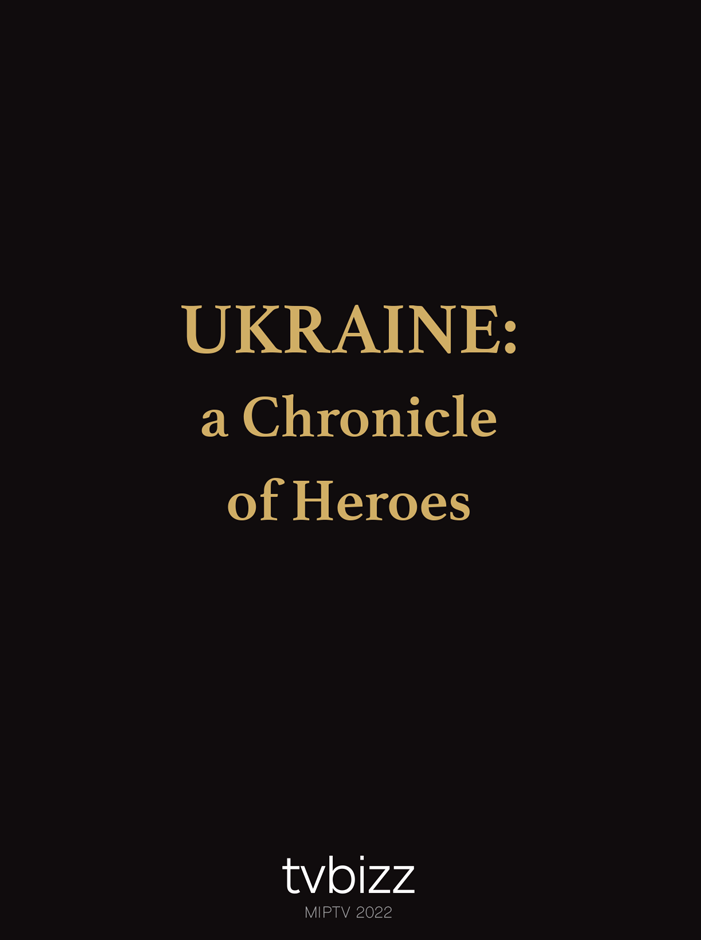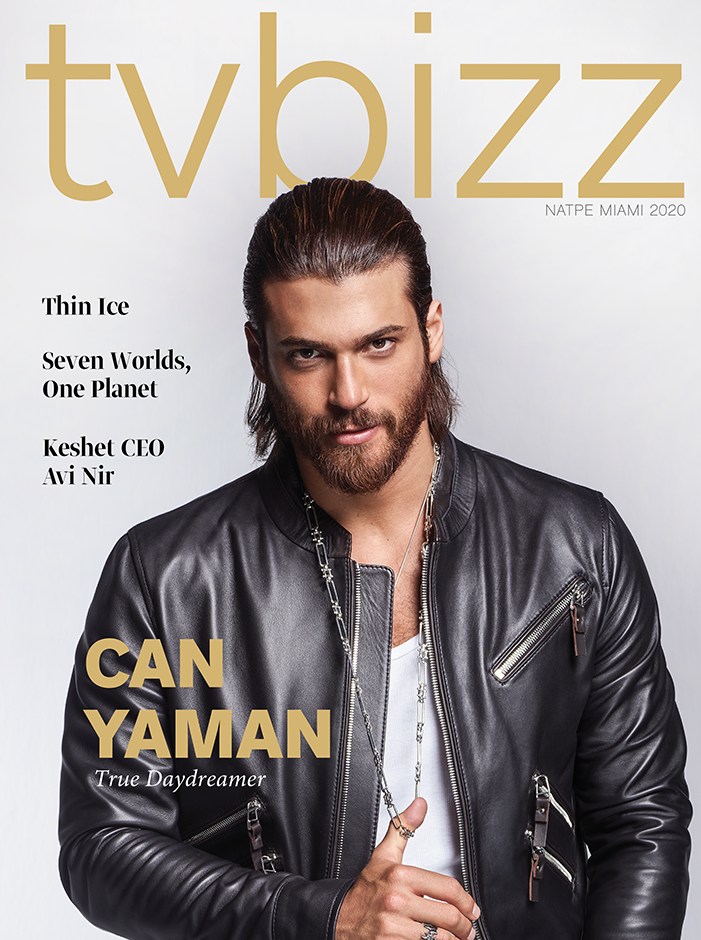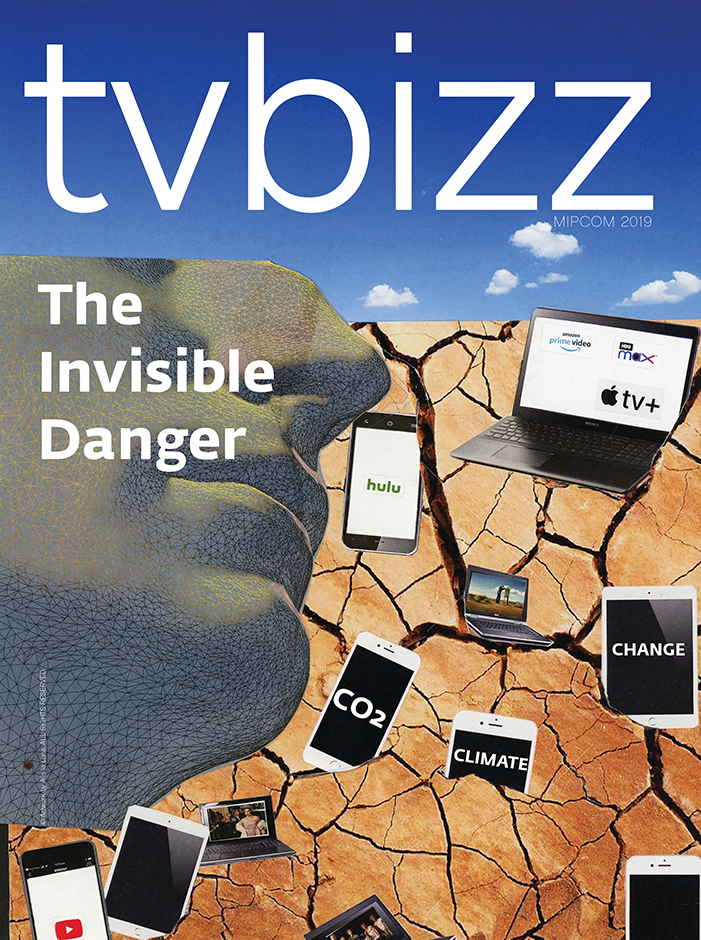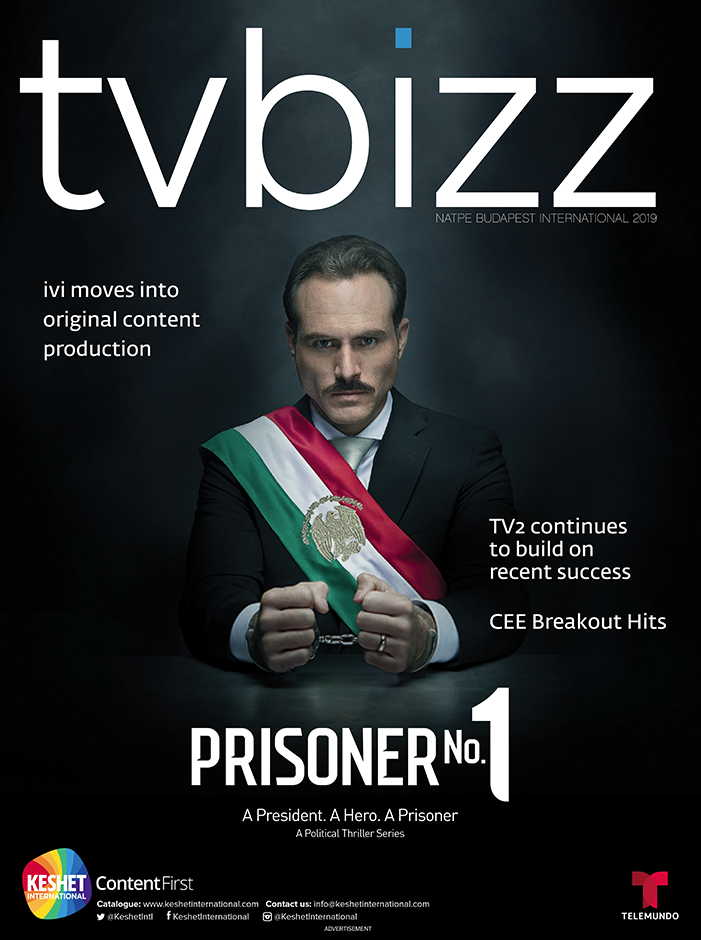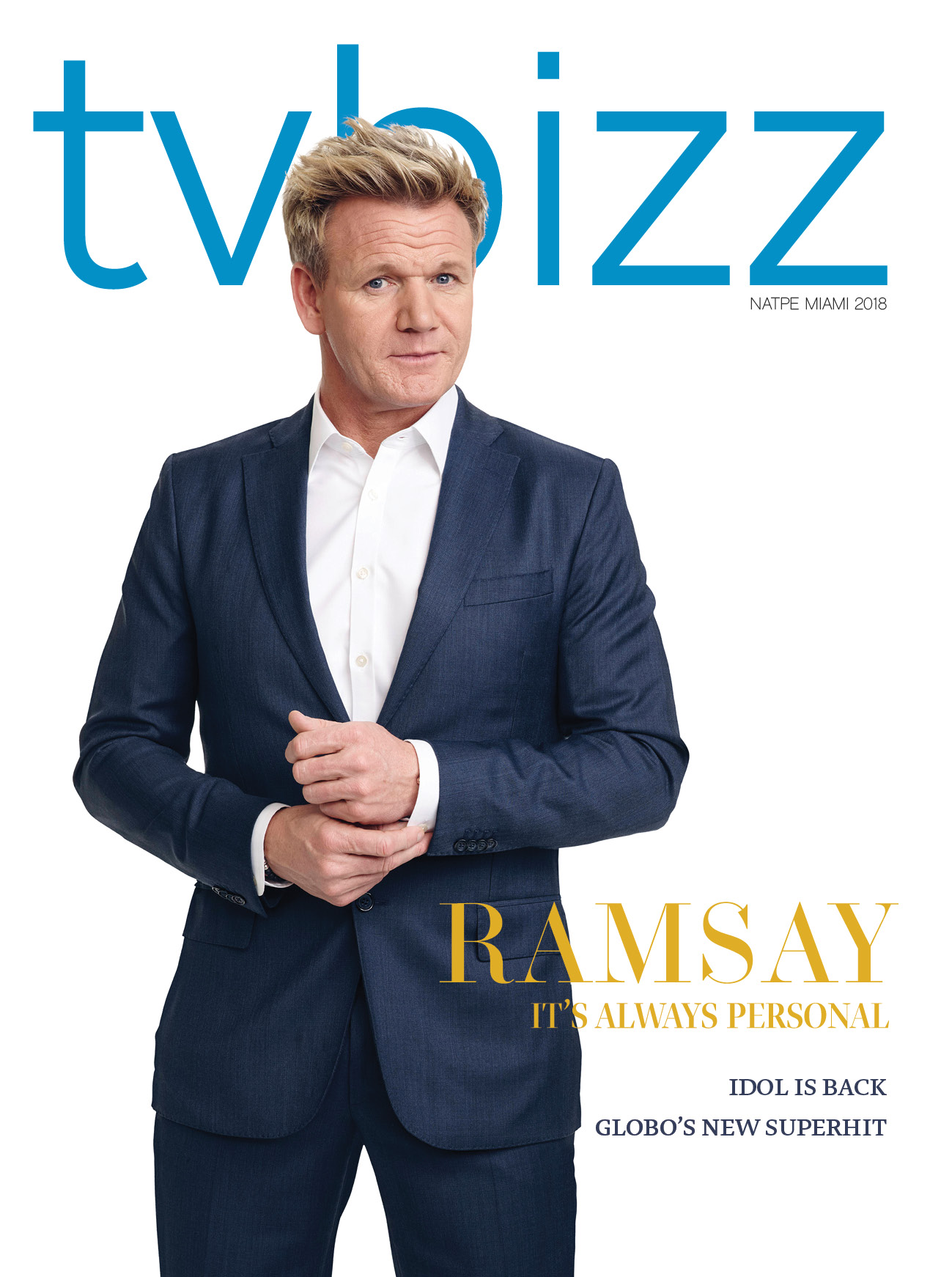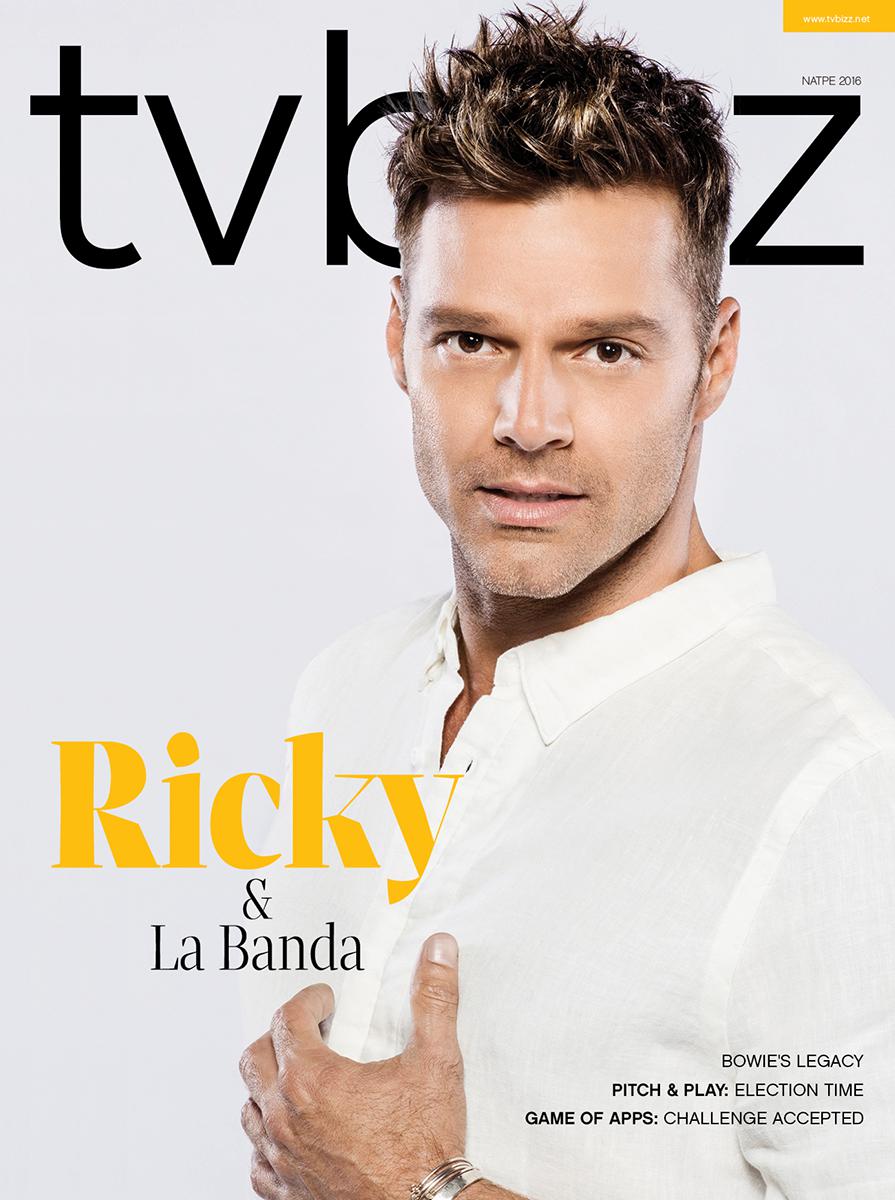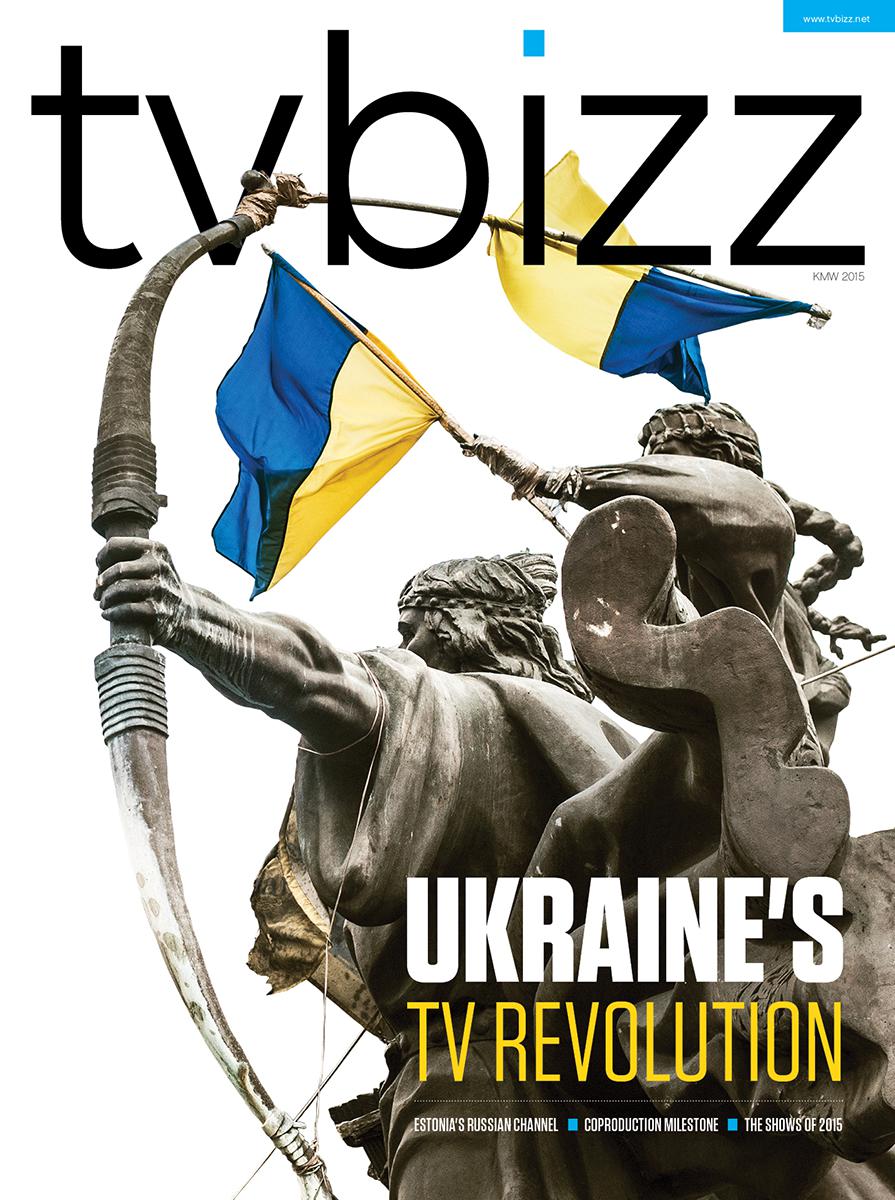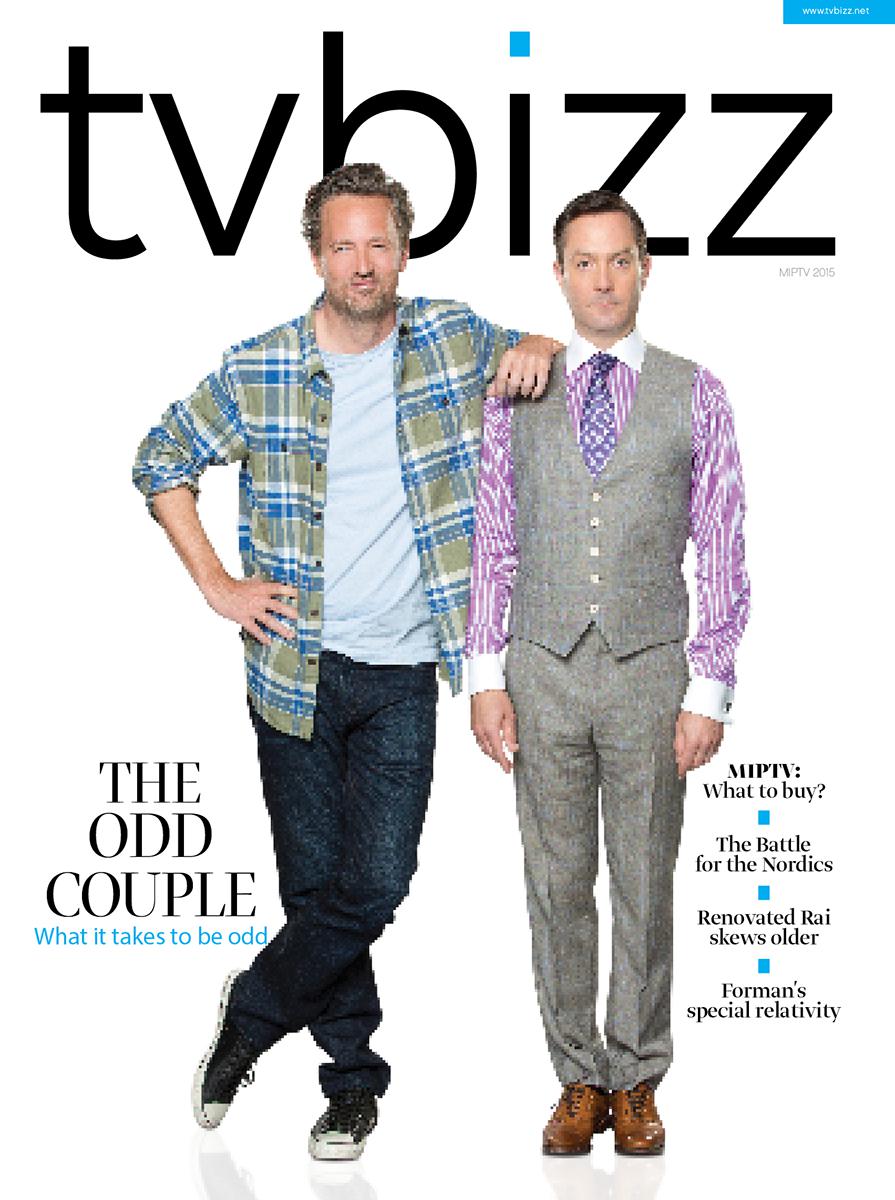How CEE countries fight Russian propaganda?
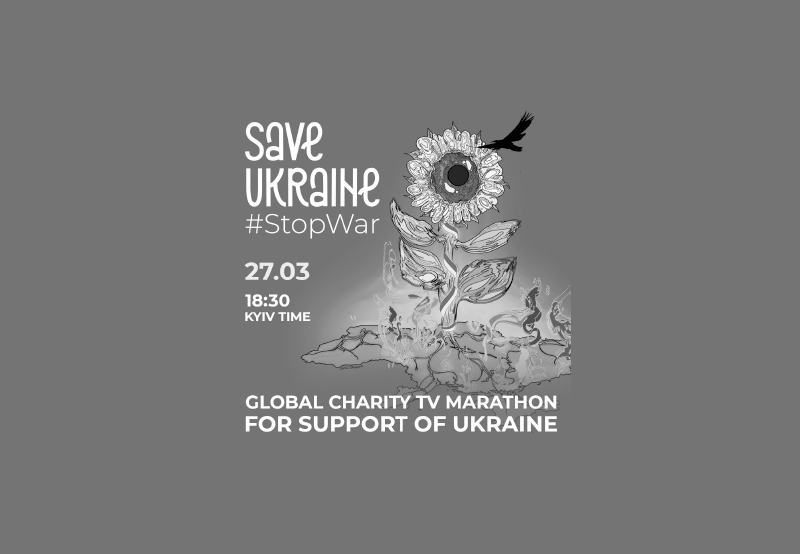
Europe stands united against Russia’s invasion of Ukraine, even more so in the countries of Central and Eastern Europe, with some exceptions like Hungary and Serbia. And while the former has not vetoed the EU sanctions against Russia and has condemned the aggression despite its government considered pro-Russian, the latter, which claims it wants to join the EU, can justly be called Russia’s Trojan horse in Europe.
These “allegiances” and trying to play the “neutral” card are also reflected in the media landscape in CEE, with many countries taking a firm stance against Russian propaganda, banning most of its channels; others adopting EU’s ban on some Russian TV nets but allowing other Russian channels to continue to spread their propaganda and… then there’s Serbia where RT can be watched on some of the major operators freely (SBB being the only exception as it replaced RT with Ukrainian channels).
On February 27, the President of the European Commission, Ursula von der Leyen, released a statement outlining certain measures in response to the Russian invasion of Ukraine. Among these measures, she announced that the EU would ban the stateowned media outlets Russia Today and Sputnik. On March 1, the Council of the EU adopted a decision by which it prohibited “operators to broadcast or to enable, facilitate or otherwise contribute to broadcast, any content by the legal persons, entities or bodies listed in Annex XV [RT- Russia Today English, RT- Russia Today UK, RT - Russia Today Germany, RT - Russia Today France, RT- Russia Today Spanish, Sputnik], including through transmission or distribution by any means such as cable, satellite, IP-TV, internet service providers, internet video-sharing platforms or applications, whether new or pre-installed”.
Reports about blocking Russian propaganda outlets around the world appear every day; but the process of removing Putin’s lies in media is far from over.
Open satellites in Europe block only Russia Today and Sputnik radio. A lot of TV channels are still available unscrambled and may be watched for free anywhere, including Ukraine. There is a score of unscrambled Russian channels available on open satellites. Also, Russian channels are included in the packages sold by pay TV providers. Certain European states, like Lithuania, Latvia, and Poland, have started banning Russian channels on all possible platforms. However, broadcasting from open satellites remains a big issue as internal sanctions do not affect them.
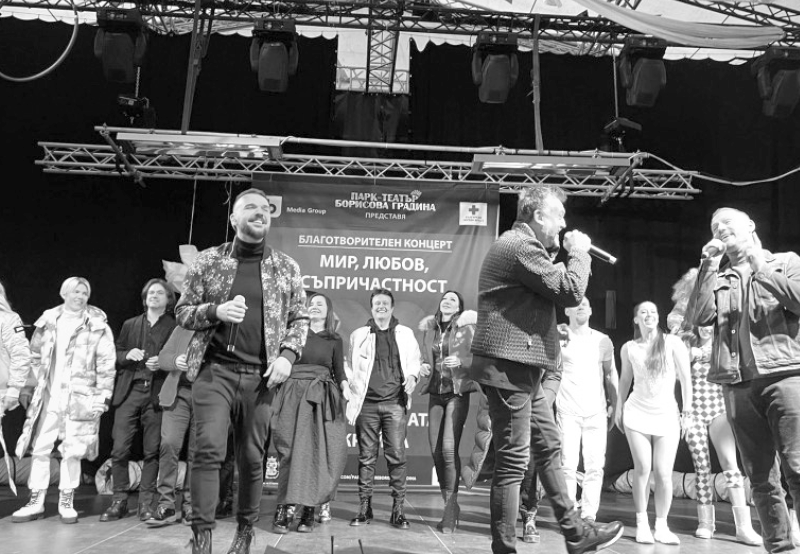
Most satellites that broadcast Russian channels are under the jurisdiction of France; those are Hotbird 13B/13C, Eutelsat 36B, Eutelsat 7/8, and Eutelsat 16A. The four Astra satellites are the responsibility of Luxembourg. There are also satellites within the jurisdiction of the USA, Turkey, Bulgaria, Azerbaijan, Malaysia, and the Bermudas.
According to Valentyn Koval, First Deputy Head of the National Council of Television and Radio Broadcasting of Ukraine, currently (as of mid-March, e.d.), only Russia Today , its local versions RT UK, RT DE, RT France, RT Spanish, and Sputnik radio have disappeared from all satellites that transmit signals available to Europe. So far, the calls by Ukrainian and European media and journalist organizations to impose sanctions on all Russian channels and ban their broadcasts have not been heard by the bureaucrats in Brussels.
Apart from the endeavors to stop the broadcast of Russian propagandist channels on open satellites, several European states are limiting their showing at their own territories via various technologies.
On February 25, the Polish media regulatory authority Krajowa Rada Radiofonii i Telewizji deleted Russian channels Russia Today, RT Documentary, RTR Planeta, Soyuz, and Russia 24 from the registry of permitted media. According to Valentyn Koval, Poland is not blocking the channels on ІРTV stream, but national providers that cover about 90% of the Polish audience have stopped re-broadcasting them.
On February 25, the regulating authority for protecting consumer rights of Estonia (CTRA) banned the broadcasting of RTR Planeta, NTV Mir, Belarus 24, Russia 24, and TVCI. The same was done by Lithuania and Latvia. “Our letters to European regulating authorities were most earnestly met by the Latvian and Lithuanian ones,” Valentyn Koval says. “They stopped broadcasting dozens of Russian channels. Those countries know well what Russia is and they’re aware that they may be next right after Ukraine.”
The Latvian regulating authority NEPLP banned the channels RTR, Russia 24, TVS, Mir 24, RTV, TNT- Comedy, TNT4 International, TNT, TNT Music, Pyatnitsa, KKhL TV, Kinopremyera, Kinosvidanie, Muzhskoye Kino, Avto Plus, Nostalgia, Kto Est Kto, Malysh TV, Russkaya Noch, TVCI, and Belarus 24.
The Lithuanian regulating authority LRTK banned RTR Planeta, Russia 24, NTV-Mir, Belarus 24, Mir 24, RVK (First Baltic Channel), and TVS. It also asked the government to give a legal permission to ban the broadcast by Gazprommedia, a company affiliated with the bank that had been sanctioned by the EU.
According to the National Broadcasting Council, Romania, Greece, and Moldova have also stopped all broadcasting of Russian channels via the legal pay TV platforms.
On March 1, the Bulgarian Council for Electronic Media (CEM) issued a resolution to temporarily restrict the retransmission of Russia Today and its subsidiaries, as well as Sputnik and its subsidiaries. However, those two channels are the only ones banned in the country – cable operators still carry Channel One and other Russian propaganda networks.
Hungary has also suspended the broadcast of television channels Russia Today (RT) and Sputnik on all platforms, including online.
As of March 2, the EU measure banning the distribution of the Russian state-owned disinformation channels Russia Today and Sputnik entered into force in the Czech Republic. Some operators like T-Mobile and O2 removed the channel a week earlier.
On March3, the Slovak Ministry of Culture announced that by the time the EU regulation and decision came into force, all major national operators had already suspended the retransmission of RT, after Slovak regulator CBR had offered to assist any such operators with legal interpretations surrounding the matter.
In Moldova, on March2, the Committee for Extraordinary Situations of the Republic of Moldova issued a decision providing the suspension of programs originally produced in countries that did not ratify the European Convention on Transfrontier Television, with the exception of films and entertainment programmes (and EU, US and Canadian programmes).
Unlike their Serbian counterparts, TV broadcasting companies in Kosovo started the withdrawal of Russian channels following a decision from the Independent Media Commission in the hopes of quelling the spread of Russian propaganda. The decision came four days after Russian troops invaded Ukraine. In North Macedonia, AAVMU told operators to remove all Russian channels in the country.
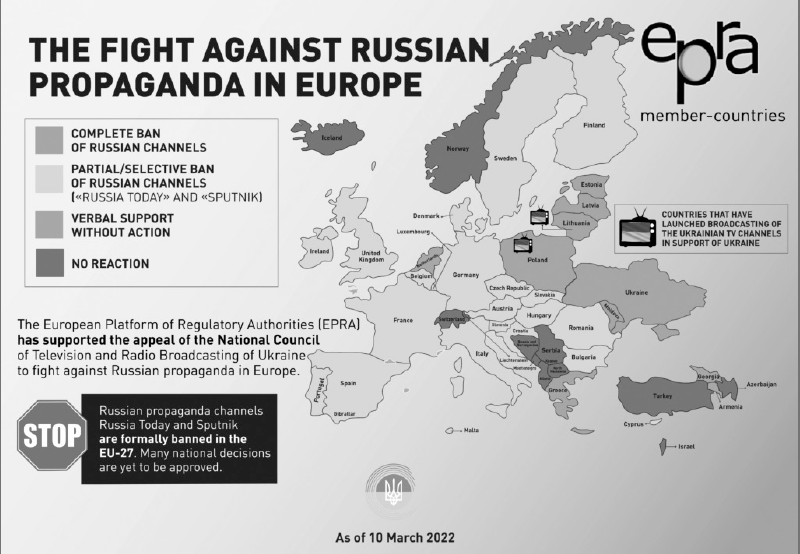
The EU urged Montenegro on March 9 to suspend the broadcasting of Russian Today and Sputnik in line with the bloc’s restrictive measures on Russia. On March 1, Montenegro said it had joined European Union sanctions on Russia over the Ukraine war, but most of the restrictive measures, including a ban on Russian media, remain on hold.
The situation in Albania is unclear. While the country stands with EU sanctions, information on whether it has banned Russian channels is not found on the website of the country’s Audiovisual Media Authority (AMA). It declared on March 4 that it was following how the Albanian media are covering developments in Ukraine.
Meanwhile, Belarus (Russia’s ally in the war) started airing RT in the country.
Central and Eastern Europe’s support for Ukraine is not only limited to banning Russian propaganda and reporting impartially about Russia’s invasion and war crimes and the situation with the millions of Ukrainian refugees in different countries. CEE broadcasters started organizing charity concerts, offering content in Ukrainian language for the refugees, with focus on kids content; operators in many countries are retransmitting Ukrainian channels; launching or relaunching news channels; acquiring Ukrainian-produced content, with one notable mention being Volodymyr Zelensky’s popular sitcom Servant of the People which features him playing the role of newly elected president; some broadcasters also stopped airing Russian content.
In late February, just days after the start of the war, Polish pubcaster TVP, Czech pubcaster CT and Romanian commercial net PRO TV launched campaigns in support of the Ukrainian people following Russia’s invasion of their country.
TVP held Solidarity with Ukraine – a live concert organized with Caritas, a gesture of support for Ukraine with a fund-raising for victims of aggression and an expression of opposition to the criminal attack by Russia. Meanwhile TVP Sport did not broadcast the fight of the Russian MMA fighter. TVN Discovery and Polska Akcja Humanitarna (PAH) collaborated to help those fleeing the war and those still in need of support in Ukraine, organizing the charity concert „Together with Ukraine“, which was aired in more than 50 countries and featured Ukrainian artists as well.
Since March 14, on weekdays TVP1 has been airing the new program “Give Ukraine a Hand”. It is intended to be a guide for those who are looking for help, but also for people who want to give it. Also an International Charity Concert-Marathon aimed at supporting Ukraine and named “Save Ukraine – StopWar” organized by TVP, Poland’s public broadcaster, took place on March 27 and was aired on major channels around Europe. Broadcasters from many countries around the world, including Estonia (EBR), Lithuania (LTR), the Czech Republic (ČT2), Georgia (GPB\First), Albania (RTSH 2), Montenegro, Slovenia, Latvia (LTV), Croatia (HRT), the Slovak Republic (RTVS), Austria (Puls 4), Cyprus, Canada (OMNI) and others rebroadcasted the marathon on their local channels.
Czech pubcaster CT also organized a charity concert. The live event from Wenceslas Square in Prague was broadcast by ČT1 and commercial net Nova. Czech Prima Group is also involved in active assistance to Ukraine. On March 6, the net aired a charity concert for the children of Ukraine, which took place in the Karlín Forum in Prague.
Romanian commercial net PRO TV also started a campaign supporting the people of Ukraine. Many media outlets in Romania joined humanitarian campaigns for refugees. After PRO TV, Digi 24, Kiss Fm and Gândul, Prima TV also announced such an initiative in early March. Prima TV is involved in a fundraising campaign for refugees in Ukraine, in partnership with Save the Children. The “We Are One” charity concert organized by PRO TV on the National Arena raised 4.5 million lei for refugees. This is about 900.000 euros. Part of that money was advertising broadcast by PRO TV during the broadcast, which was donated in full.
Lithuania’s LNK reached out a helping hand to its colleagues in Ukraine by donating TV equipment. LNK‘s employees delivered the equipment themselves to an emergency collection station at the border near Peremisli and made sure that it would reach their Ukrainian colleagues safely, according to a press statement.
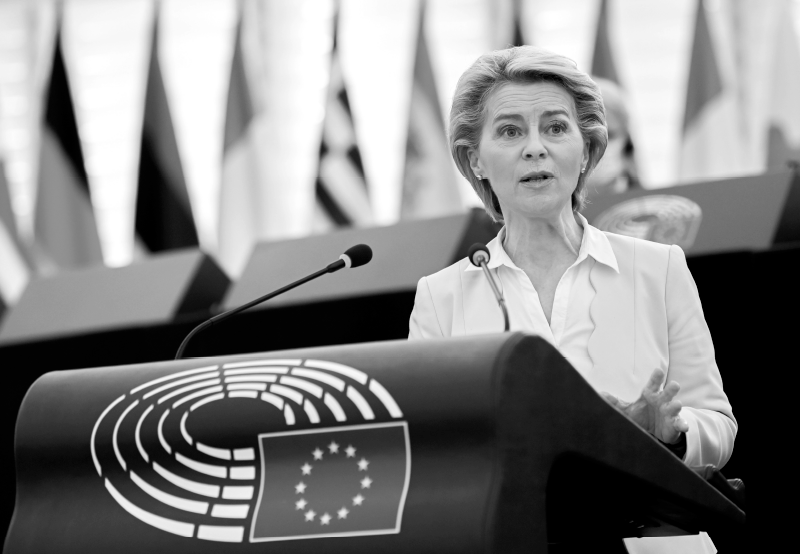
The Baltic broadcasters also organized campaigns in support of Ukraine. Estonia’s ETV aired a 2-hour charity program, calling for support for Ukrainians and organizations helping Ukraine. The special show “Let‘s Help Ukraine!” focused on various ways to support and to provide those, who escaped from the war in Ukraine with the much-needed assistance and a safer life and future. Kanal 2 also aired a concert, raising nearly 700.000 euros.
On February 25, Latvian Television (LTV) aired a special concert dedicated to the freedom of Ukraine, in which Latvian musicians as well as members of the Latvian Song and Dance Celebration movement - choirs, brass bands, folk dance and folklore groups - dedicated their performances in support of Ukraine.
On February 28, the Hungarian broadcaster MTVA launched the campaign “Hungary is Coming Together” on all of its platforms. The campaign gathers donations for Hungarians living in Transcarpathia and those fleeing the Russian-Ukrainian conflict. On March 7, RTL Hungary started providing 5 free appearances on its most watched channel, RTL Klub, as well as 15 additional free appearances on other channels of its linear portfolio for fundraising organizations whose aim is to help the people of Ukraine.
Together with the Slovenian Red Cross and Caritas Slovenia, RTV Slovenia organized a charity concert to help the refugees from Ukraine, which raised over 799.650 euros three days after its broadcast, and donations are still accepted.
In Bulgaria, commercial net bTV aired a charity show and concert called “The Good Example”. The charity program started at 12.30 on Sunday, March 6, and was broadcast on bTV and bTV Radio. The concert „Peace, Love, Empathy“ was part of the campaign. Pubcasters BNT and BNR also organized a charity concert called “Together for Ukraine” on March 28. The concert organized with the National Theater will air on BNT1 on April 3.
Also, the European Broadcasting Union (EBU) announced that members from across the continent - including Belgium, the Czech Republic, Denmark, Estonia, Finland, France, Georgia, Hungary, Italy, Latvia, Lithuania, Poland, the Netherlands, Slovenia, Spain, and Switzerland - are organizing fund-raising concerts in collaboration with the Red Cross and other NGOs; with further initiatives including live vigils, special performances of Ukrainian music and regular broadcasts of the Ukrainian national anthem.
Behind the scenes, the EBU has also been co-ordinating technical support for UA:PBC and working, with assistance from Members, to ensure public service media can continue to broadcast and reach Ukrainian citizens.
These “allegiances” and trying to play the “neutral” card are also reflected in the media landscape in CEE, with many countries taking a firm stance against Russian propaganda, banning most of its channels; others adopting EU’s ban on some Russian TV nets but allowing other Russian channels to continue to spread their propaganda and… then there’s Serbia where RT can be watched on some of the major operators freely (SBB being the only exception as it replaced RT with Ukrainian channels).
On February 27, the President of the European Commission, Ursula von der Leyen, released a statement outlining certain measures in response to the Russian invasion of Ukraine. Among these measures, she announced that the EU would ban the stateowned media outlets Russia Today and Sputnik. On March 1, the Council of the EU adopted a decision by which it prohibited “operators to broadcast or to enable, facilitate or otherwise contribute to broadcast, any content by the legal persons, entities or bodies listed in Annex XV [RT- Russia Today English, RT- Russia Today UK, RT - Russia Today Germany, RT - Russia Today France, RT- Russia Today Spanish, Sputnik], including through transmission or distribution by any means such as cable, satellite, IP-TV, internet service providers, internet video-sharing platforms or applications, whether new or pre-installed”.
Reports about blocking Russian propaganda outlets around the world appear every day; but the process of removing Putin’s lies in media is far from over.
Open satellites in Europe block only Russia Today and Sputnik radio. A lot of TV channels are still available unscrambled and may be watched for free anywhere, including Ukraine. There is a score of unscrambled Russian channels available on open satellites. Also, Russian channels are included in the packages sold by pay TV providers. Certain European states, like Lithuania, Latvia, and Poland, have started banning Russian channels on all possible platforms. However, broadcasting from open satellites remains a big issue as internal sanctions do not affect them.

"Peace, Love, Empathy", bTV
Most satellites that broadcast Russian channels are under the jurisdiction of France; those are Hotbird 13B/13C, Eutelsat 36B, Eutelsat 7/8, and Eutelsat 16A. The four Astra satellites are the responsibility of Luxembourg. There are also satellites within the jurisdiction of the USA, Turkey, Bulgaria, Azerbaijan, Malaysia, and the Bermudas.
According to Valentyn Koval, First Deputy Head of the National Council of Television and Radio Broadcasting of Ukraine, currently (as of mid-March, e.d.), only Russia Today , its local versions RT UK, RT DE, RT France, RT Spanish, and Sputnik radio have disappeared from all satellites that transmit signals available to Europe. So far, the calls by Ukrainian and European media and journalist organizations to impose sanctions on all Russian channels and ban their broadcasts have not been heard by the bureaucrats in Brussels.
Apart from the endeavors to stop the broadcast of Russian propagandist channels on open satellites, several European states are limiting their showing at their own territories via various technologies.
On February 25, the Polish media regulatory authority Krajowa Rada Radiofonii i Telewizji deleted Russian channels Russia Today, RT Documentary, RTR Planeta, Soyuz, and Russia 24 from the registry of permitted media. According to Valentyn Koval, Poland is not blocking the channels on ІРTV stream, but national providers that cover about 90% of the Polish audience have stopped re-broadcasting them.
On February 25, the regulating authority for protecting consumer rights of Estonia (CTRA) banned the broadcasting of RTR Planeta, NTV Mir, Belarus 24, Russia 24, and TVCI. The same was done by Lithuania and Latvia. “Our letters to European regulating authorities were most earnestly met by the Latvian and Lithuanian ones,” Valentyn Koval says. “They stopped broadcasting dozens of Russian channels. Those countries know well what Russia is and they’re aware that they may be next right after Ukraine.”
The Latvian regulating authority NEPLP banned the channels RTR, Russia 24, TVS, Mir 24, RTV, TNT- Comedy, TNT4 International, TNT, TNT Music, Pyatnitsa, KKhL TV, Kinopremyera, Kinosvidanie, Muzhskoye Kino, Avto Plus, Nostalgia, Kto Est Kto, Malysh TV, Russkaya Noch, TVCI, and Belarus 24.
The Lithuanian regulating authority LRTK banned RTR Planeta, Russia 24, NTV-Mir, Belarus 24, Mir 24, RVK (First Baltic Channel), and TVS. It also asked the government to give a legal permission to ban the broadcast by Gazprommedia, a company affiliated with the bank that had been sanctioned by the EU.
According to the National Broadcasting Council, Romania, Greece, and Moldova have also stopped all broadcasting of Russian channels via the legal pay TV platforms.
On March 1, the Bulgarian Council for Electronic Media (CEM) issued a resolution to temporarily restrict the retransmission of Russia Today and its subsidiaries, as well as Sputnik and its subsidiaries. However, those two channels are the only ones banned in the country – cable operators still carry Channel One and other Russian propaganda networks.
Hungary has also suspended the broadcast of television channels Russia Today (RT) and Sputnik on all platforms, including online.
As of March 2, the EU measure banning the distribution of the Russian state-owned disinformation channels Russia Today and Sputnik entered into force in the Czech Republic. Some operators like T-Mobile and O2 removed the channel a week earlier.
On March3, the Slovak Ministry of Culture announced that by the time the EU regulation and decision came into force, all major national operators had already suspended the retransmission of RT, after Slovak regulator CBR had offered to assist any such operators with legal interpretations surrounding the matter.
In Moldova, on March2, the Committee for Extraordinary Situations of the Republic of Moldova issued a decision providing the suspension of programs originally produced in countries that did not ratify the European Convention on Transfrontier Television, with the exception of films and entertainment programmes (and EU, US and Canadian programmes).
Unlike their Serbian counterparts, TV broadcasting companies in Kosovo started the withdrawal of Russian channels following a decision from the Independent Media Commission in the hopes of quelling the spread of Russian propaganda. The decision came four days after Russian troops invaded Ukraine. In North Macedonia, AAVMU told operators to remove all Russian channels in the country.

EPRA Nacrada
The EU urged Montenegro on March 9 to suspend the broadcasting of Russian Today and Sputnik in line with the bloc’s restrictive measures on Russia. On March 1, Montenegro said it had joined European Union sanctions on Russia over the Ukraine war, but most of the restrictive measures, including a ban on Russian media, remain on hold.
The situation in Albania is unclear. While the country stands with EU sanctions, information on whether it has banned Russian channels is not found on the website of the country’s Audiovisual Media Authority (AMA). It declared on March 4 that it was following how the Albanian media are covering developments in Ukraine.
Meanwhile, Belarus (Russia’s ally in the war) started airing RT in the country.
Central and Eastern Europe’s support for Ukraine is not only limited to banning Russian propaganda and reporting impartially about Russia’s invasion and war crimes and the situation with the millions of Ukrainian refugees in different countries. CEE broadcasters started organizing charity concerts, offering content in Ukrainian language for the refugees, with focus on kids content; operators in many countries are retransmitting Ukrainian channels; launching or relaunching news channels; acquiring Ukrainian-produced content, with one notable mention being Volodymyr Zelensky’s popular sitcom Servant of the People which features him playing the role of newly elected president; some broadcasters also stopped airing Russian content.
In late February, just days after the start of the war, Polish pubcaster TVP, Czech pubcaster CT and Romanian commercial net PRO TV launched campaigns in support of the Ukrainian people following Russia’s invasion of their country.
TVP held Solidarity with Ukraine – a live concert organized with Caritas, a gesture of support for Ukraine with a fund-raising for victims of aggression and an expression of opposition to the criminal attack by Russia. Meanwhile TVP Sport did not broadcast the fight of the Russian MMA fighter. TVN Discovery and Polska Akcja Humanitarna (PAH) collaborated to help those fleeing the war and those still in need of support in Ukraine, organizing the charity concert „Together with Ukraine“, which was aired in more than 50 countries and featured Ukrainian artists as well.
Since March 14, on weekdays TVP1 has been airing the new program “Give Ukraine a Hand”. It is intended to be a guide for those who are looking for help, but also for people who want to give it. Also an International Charity Concert-Marathon aimed at supporting Ukraine and named “Save Ukraine – StopWar” organized by TVP, Poland’s public broadcaster, took place on March 27 and was aired on major channels around Europe. Broadcasters from many countries around the world, including Estonia (EBR), Lithuania (LTR), the Czech Republic (ČT2), Georgia (GPB\First), Albania (RTSH 2), Montenegro, Slovenia, Latvia (LTV), Croatia (HRT), the Slovak Republic (RTVS), Austria (Puls 4), Cyprus, Canada (OMNI) and others rebroadcasted the marathon on their local channels.
Czech pubcaster CT also organized a charity concert. The live event from Wenceslas Square in Prague was broadcast by ČT1 and commercial net Nova. Czech Prima Group is also involved in active assistance to Ukraine. On March 6, the net aired a charity concert for the children of Ukraine, which took place in the Karlín Forum in Prague.
Romanian commercial net PRO TV also started a campaign supporting the people of Ukraine. Many media outlets in Romania joined humanitarian campaigns for refugees. After PRO TV, Digi 24, Kiss Fm and Gândul, Prima TV also announced such an initiative in early March. Prima TV is involved in a fundraising campaign for refugees in Ukraine, in partnership with Save the Children. The “We Are One” charity concert organized by PRO TV on the National Arena raised 4.5 million lei for refugees. This is about 900.000 euros. Part of that money was advertising broadcast by PRO TV during the broadcast, which was donated in full.
Lithuania’s LNK reached out a helping hand to its colleagues in Ukraine by donating TV equipment. LNK‘s employees delivered the equipment themselves to an emergency collection station at the border near Peremisli and made sure that it would reach their Ukrainian colleagues safely, according to a press statement.

Ursula von der Leyen
The Baltic broadcasters also organized campaigns in support of Ukraine. Estonia’s ETV aired a 2-hour charity program, calling for support for Ukrainians and organizations helping Ukraine. The special show “Let‘s Help Ukraine!” focused on various ways to support and to provide those, who escaped from the war in Ukraine with the much-needed assistance and a safer life and future. Kanal 2 also aired a concert, raising nearly 700.000 euros.
On February 25, Latvian Television (LTV) aired a special concert dedicated to the freedom of Ukraine, in which Latvian musicians as well as members of the Latvian Song and Dance Celebration movement - choirs, brass bands, folk dance and folklore groups - dedicated their performances in support of Ukraine.
On February 28, the Hungarian broadcaster MTVA launched the campaign “Hungary is Coming Together” on all of its platforms. The campaign gathers donations for Hungarians living in Transcarpathia and those fleeing the Russian-Ukrainian conflict. On March 7, RTL Hungary started providing 5 free appearances on its most watched channel, RTL Klub, as well as 15 additional free appearances on other channels of its linear portfolio for fundraising organizations whose aim is to help the people of Ukraine.
Together with the Slovenian Red Cross and Caritas Slovenia, RTV Slovenia organized a charity concert to help the refugees from Ukraine, which raised over 799.650 euros three days after its broadcast, and donations are still accepted.
In Bulgaria, commercial net bTV aired a charity show and concert called “The Good Example”. The charity program started at 12.30 on Sunday, March 6, and was broadcast on bTV and bTV Radio. The concert „Peace, Love, Empathy“ was part of the campaign. Pubcasters BNT and BNR also organized a charity concert called “Together for Ukraine” on March 28. The concert organized with the National Theater will air on BNT1 on April 3.
Also, the European Broadcasting Union (EBU) announced that members from across the continent - including Belgium, the Czech Republic, Denmark, Estonia, Finland, France, Georgia, Hungary, Italy, Latvia, Lithuania, Poland, the Netherlands, Slovenia, Spain, and Switzerland - are organizing fund-raising concerts in collaboration with the Red Cross and other NGOs; with further initiatives including live vigils, special performances of Ukrainian music and regular broadcasts of the Ukrainian national anthem.
Behind the scenes, the EBU has also been co-ordinating technical support for UA:PBC and working, with assistance from Members, to ensure public service media can continue to broadcast and reach Ukrainian citizens.










